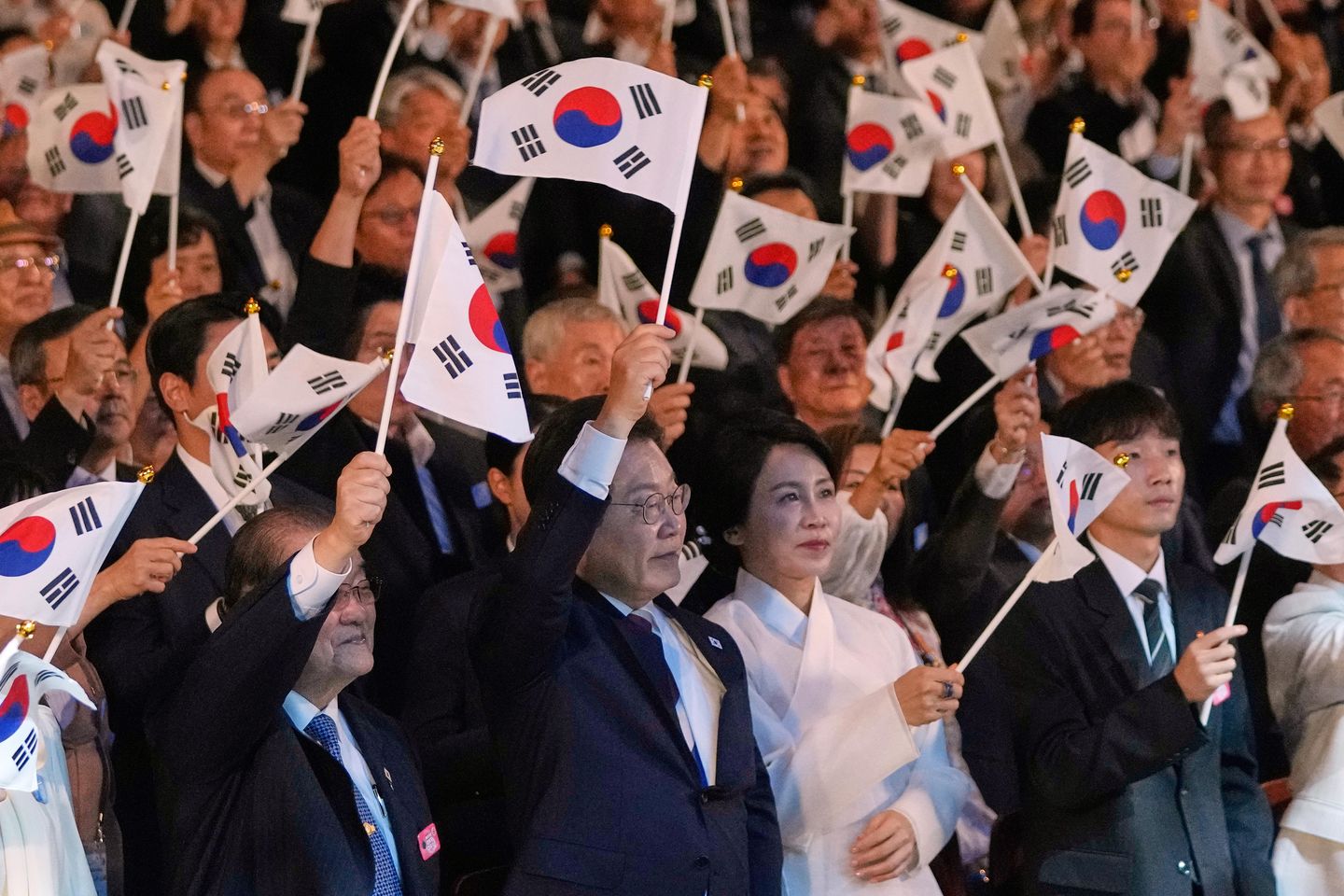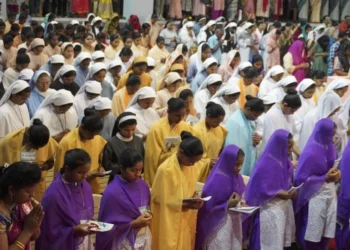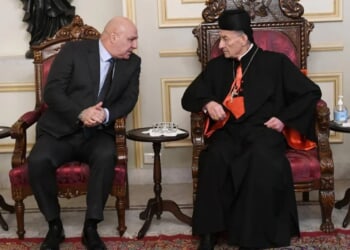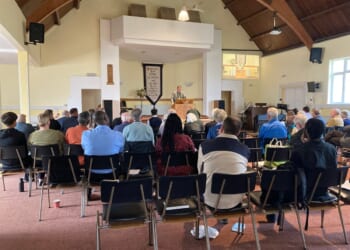
SEOUL, South Korea — South Korean President Lee Jae-myung, who campaigned as a moderate after a career as a liberal firebrand, had conservative critics on edge at home and in Washington ahead of a summit at the White House on Monday.
Mr. Lee will meet with President Trump after huddling in Tokyo on Saturday with his Japanese counterpart, Prime Minister Shigeru Ishiba.
Mr. Lee and Mr. Trump have tested Korean nerves. Mr. Trump has not yet assigned an ambassador to Seoul, and domestic supporters and critics skeptical of the lifelong liberal’s untested diplomatic skills are intently watching Mr. Lee’s overdue trip to Washington. An invitation was anticipated last month.
Mr. Lee’s meeting with Mr. Ishiba earned good reviews. The Asian neighbors agreed to expand cooperation in security, trade, tourism and defense against North Korea.
That outcome is doubly surprising given Mr. Lee’s pre-presidential reputation as a Japanophobe who addressed anti-Tokyo rallies. More broadly, he has ditched considerable political baggage from a leftist past in his transition from revolutionary to ruler.
The presidency was up for grabs in June after conservative President Yoon Suk Yeol shook Korea in December by declaring martial law.
Mr. Lee, an opposition leader who had frustrated Mr. Yoon’s governance in the National Assembly, defied commandos to lead lawmakers in a vote overturning martial law, dooming Mr. Yoon.
On Feb. 18, Mr. Lee strikingly announced that his liberal party must “take the center right” political ground.
If his aim was to reassure middle Korea — which, according to polls, is firmly wedded to the U.S. alliance — he succeeded. With Mr. Yoon impeached, Mr. Lee won the presidential election handily.
The outcome of his summit Saturday shows that Mr. Lee is sticking to his new course.
Behind closed doors, the meeting also granted Mr. Lee the opportunity to “exchange views with Japan, which is facing similar challenges because of Mr. Trump’s demands for tariff pressure and alliance modernization,” Lim Eun-jeong, an international relations professor at Kongju National University, wrote in a vernacular commentary.
Stakes are high in Washington, and Mr. Lee is under a barrage of criticism from high-profile U.S. conservatives who are unconvinced he has ditched his left-wing past and who may have Mr. Trump’s ear.
Coming to America
In the run-up to the summit, Mr. Lee conferred with major South Korean business leaders and deployed his foreign minister to Washington to lay last-minute groundwork.
Detailed questions hover over the $350 billion in South Korean investments that Mr. Trump announced for the U.S. and over South Korea’s role in maintaining or even building U.S. shipping and taking a stake in a mooted LNG pipeline in Alaska.
Even dicier issues are in play in security. Will Mr. Trump demand more cash, “burden sharing,” in return for the security afforded South Korea by the presence of U.S. forces? Will Seoul assume wartime operational command of its troops, a move some think would collapse the potent, U.S.-led Combined Forces Command?
Above all: Will Washington demand regional freedom of maneuver for U.S. forces stationed in strategically sited South Korea, potentially freeing them for China-facing operations?
While negotiating these issues, Mr. Lee must convince Mr. Trump that his U.S. critics are off base.
They have dredged up a 2021 statement in which he called American GIs an “occupying force,” and they are convinced he wants to dismantle the alliance. They accuse him of being pro-Chinese and pro-North Korea and allege that the June presidential election was fraudulent.
On social media, some U.S. conservatives dub him a communist.
In fact, Mr. Lee has made clear repeatedly that the alliance is the “cornerstone” of his foreign policy. South Korea and the U.S. military are currently conducting joint drills.
Though he seeks improved relations with Beijing, Mr. Lee has announced no major policy shift toward China. His only North Korea maneuver thus far has been halting propaganda broadcasts across the Demilitarized Zone and dismantling related gear.
He expressed hopes of thawing the ties with Pyongyang that froze in 2019, but Mr. Trump did precisely that in his first term.
Mr. Lee’s Cabinet looks balanced. Although his intelligence chief and unification minister are seen as pro-Pyongyang, his national security adviser and foreign minister are considered centrists.
Koreans remain onside. The most recent Gallup poll, released Friday, gave the president approval ratings of 56%, a higher rate than Mr. Yoon achieved and above Mr. Lee’s share of the national vote in June.
He won that with 49.42%, which aligned with preelection opinion polling.
Though anti-Lee protesters rallied Saturday in central Seoul, South Korea’s mainstream commentariat — its professional media, judiciary, academia and even the conservative People Power Party — all accepted the election results.
Mr. Lee’s U.S. critics are now facing pushback.
In July, Korean activists filed a defamation lawsuit against U.S. academic Morse Tan. Mr. Tan has sought to visit the imprisoned Mr. Yoon, vocally promoted the idea of a “stolen” election and raised criminal allegations against Mr. Lee.
Mr. Tan was ambassador at large for global criminal justice in Mr. Trump’s first administration.
Last week, the South Korean Embassy in Washington responded to conservative author and China hawk Gordon Chang’s anti-Lee column in The Hill.
“Lee is virulently anti-American,” wrote Mr. Chang, who similarly criticized the liberal President Moon Jae-in. “At stake, therefore, is the future of the treaty relationship between Washington and Seoul.”
The embassy called the article “inaccurate and misleading” and said it was spreading “baseless accusations.”
In jittery Seoul, the exchange received attention from mainstream media, but U.S. analysts say Mr. Trump may be unmoved by criticism of Mr. Lee.
“The American conservatives most against Lee have a connection — familial, professional or otherwise — to the peninsula and to the alliance,” said Rob York, regional affairs director at Pacific Forum. “That does not sound like Trump’s inner circle to me.”
“Lee has been briefed up and knows what to say to Trump,” said Daniel Pinkston, who teaches international relations at Troy University.
He said Mr. Lee can learn from Ukrainian President Volodymyr Zelenskyy’s example: “Zelenskyy got it.”
However, risk remains. “A bad meeting will validate those in Lee’s party with less attachment to the alliance,” Mr. York said.
Going too far?
Mr. Lee is showing two faces domestically.
Unlike Mr. Yoon, he has met with the opposition and paid all adults vouchers worth $108 or more last month to bolster domestic consumption.
In South Korea’s unforgiving political culture, former presidents customarily face judicial punishment. Even by those standards, the campaign against Mr. Yoon and his wife — both of whom are detained, a first in South Korean judicial history — is unusually fierce.
With some prosecutors convinced that Mr. Yoon sought to bolster martial law by generating tensions with the North, military commands have been investigated, including the joint South Korea-U.S. air base at Osan.
Last month, prosecutors raided Osan in search of data on an alleged South Korean drone intrusion over Pyongyang.
Amid multiple raids on military posts, churches and the main opposition party, the Osan raid — reportedly on a Korean sector of the base, with no U.S. personnel encountered — generated little local news.
Even so, some South Korean conservative media fret that the raid breached alliance protocols, and a civic group accused prosecutors of abusing their power.
Mr. Lee holds the legislature and the executive branches of the South Korean government, and some fear he may be seeking to control the judiciary.
Investigations have been opened into churches that prosecutors think may have colluded with Mr. Yoon or bribed his wife.
However, an initiative to expand the Supreme Court’s bench is on hold. The plan was to fill the court with judges sympathetic to Mr. Lee, who faces multiple criminal allegations and is likely to face a massive legal attack if a conservative administration returns to power.




![Steak ’n Shake Mocks Cracker Barrel Over Identity-Erasing Rebrand [WATCH]](https://www.right2024.com/wp-content/uploads/2025/08/Steak-n-Shake-Mocks-Cracker-Barrel-Over-Identity-Erasing-Rebrand-WATCH-350x250.jpg)



![Soros Network, Others Behind LA Riots [WATCH]](https://www.right2024.com/wp-content/uploads/2025/06/Soros-Network-Others-Behind-LA-Riots-WATCH-350x250.jpg)
![Mount Rushmore Could Get Trump Upgrade Under GOP Push [WATCH]](https://www.right2024.com/wp-content/uploads/2025/07/Mount-Rushmore-Could-Get-Trump-Upgrade-Under-GOP-Push-WATCH-350x250.jpg)





